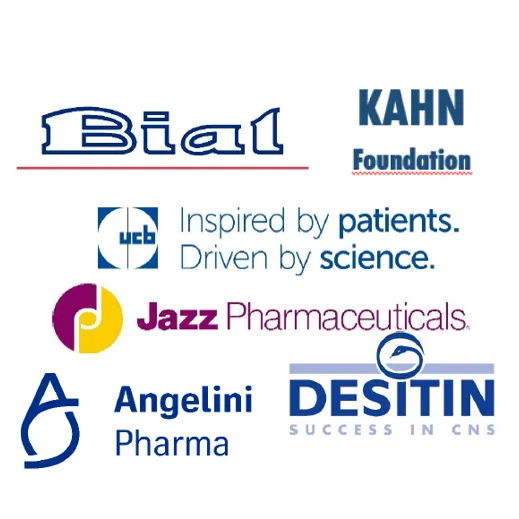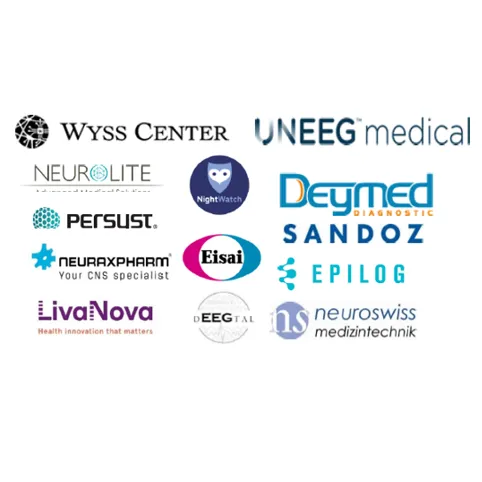- 9h - 9h15: Welcome
Roland Wiest
Margitta Seeck

Dieses Jahr lädt Sie die Abteilung für klinische Neurowissenschaften in Zusammenarbeit mit dem Schweizerischen Nationalfonds (SNF) zur Teilnahme an der DACH-Jahrestagung, der deutsch-österreichisch-schweizerischen Arbeitsgemeinschaft für Epilepsie, ein.
Bei dieser Gelegenheit werden Sie durch Vorträge, Podiumsdiskussionen und Fallstudien auf den neuesten Stand der modernen Epileptologie gebracht.
Die dreitägige Veranstaltung markiert auch das 30-jährige Jubiläum der DACH-Gruppe.
Programm
Differentiating epileptic from non-epileptic conditions: EEG
- 9h15 - 9h40 : Spikes – what is their yield for diagnosis and relapse risk?
Baudoin Jin
- 9h40 - 10h05: The yield of computational biomarkers derived from EEG signals in the diagnosis of epilepsy
Stefano Gallotto
- 10h05 - 10h30: From research to clinical practice: the next generation of tools to diagnose epilepsy at the first seizure
Eric Menetre
- 10h30 - 10h55: Focal slowing: another marker for epileptic activity?
Serge Vulliemoz
- 10h55 - 11h20: Coffee break
Differentiating epileptic from non-epileptic conditions: MRI
- 11h20 - 11h45: Protocols in epilepsy imaging: Structure and function
Roland Wiest
- 11h45 - 12h10: Imaging of neuronal activity with the MRI
Milena Capiglioni
- 12h10 - 12h35: From morphometry to connectomics: Clinical implications
Christian Rummel
- 12h35-14h00: Lunch
Modern epilepsy care: the European perspective
- 14h00 - 14h45: The optimal patient care after a first seizure
Paul Boon
- 14h45 - 15h00: Coffee break
Artificial intelligence in epileptology: friend or foe?
- 15h00 - 15h25: AI in EEG: Decision support without a neurologist
Pieter van Mierlo
- 15h25 - 15h50: AI in neuroradiology: Decision support without a neurologist
Richard McKinley
- 15h50 - 16h15: AI in prediction of anti-seizure drug effect
Markus Gschwind
- 16h15 - 16h30: Coffee break
Industry symposium BIAL: Specific patients, specific needs
- 16h30 - 17h30: Neuropsychiatric Comorbidities in Epilepsy
Pamela AgazziGeriatric epilepsy - the invisible epidemi
Margitta Seeck
- 19h30: Dinner
Epilepsy and driving
- 8h30 - 9h15: Driving ban after a first seizure – how long is necessary?
Tony Marson
- 9h15 - 9h40: Should we treat the EEG?
Pierre Megevand
- 9:40-10:05: Coffee break
What else? - when EEG and MRI are negative
- 10h05 - 10h30: Update on markers for a cardiovascular origin
Christoph Baumgartner
- 10h30 - 10h55: Update on markers for a psychogenic origin
Lukas Imbach
- 10h55 - 11h20: Update on laboratory parameters: what to test in the emergency?
Fabienne Picard
- 11h20 - 11h45: When is genetic testing indicated after a first seizure?
Martha Feucht
- 11h45 - 12h35: Speed Dating part 1 (Gold and Silver)
Industry
- 12h35 - 13h45: Lunch
Stroke and epilepsy
- 13h45 - 14h30: Predicting epilepsy after stroke
Marian Galovic
First seizures and new onset epilepsy: practical issues
- 14h30 - 14h55: First seizures in children: epidemiological data
Alexandre Datta
- 14h55 - 15h20: After stroke units: epilepsy units?
Stephan Rüegg
- 15h20 - 15h45: Early epilepsy surgery: when and for whom?
Friedhelm Schmitt
- 15h45 - 16h10 Coffee break
- 16h10 - 16h35: First seizure in the not-so-young age group
Günter Krämer
- 16h35 - 17h35: ”speed dating”: each company presents in 5 min their product highlights
All Industry
- 17h35 - 18h15: Break
Industry symposium ANGELINI
- 18h15 - 19h15:
The prevention of SUDEP
Philippe RyvlinNavigating women’s healthy in epilepsy: insights from EURAP pregnancy registry
Bettina Schmitz
- Starting 20h30: Gala Dinner
KAHN Award CeremonyIntroduction
Dominique Kahn, President of the FoundationLaudatio for Prof. Andrea ROSSETTI, Lausanne
Epileptologie auf der IPS: die Legende des Heiligen „Mehr“
Lukas ImbachLaudatio for Prof. Stefan RÜEGG, Basel
“Zwischen Augiasstall und Elysium – Epileptologie in der Schweiz des 21. Jahrhunderts”
Barbara Tettenborn
Fallvorstellungen/ Case studies:
Kurios, informativ, spektakulär/ funny, informative, spectacular – what would YOU have done - wie hätten Sie’s gemacht? (mit interaktiver Diskussion, English or German)
- 8h30 - 8h55: Case 1
Christian Tilz
- 8h55 - 9h20: Case 2
Thomas Eichele
- 9h20 - 9h55: Case 3
NBD
- 9h55 - 10h15: Zur Geschichte des DACH-Arbeitskreises
Bruno Mamoli
- 10h15 - 10h40: Coffee Break
The future - What’s next for modern epileptology? A controversy
- 10h40 - 11h10: So many achievements in the last 20 years
Andreas Schulze-Bonhage
Moderation: Ektarina Pataraia, Stephan Rüegg
- 11h10 - 11h40: No need to rest on our laurels
Eugen Trinka
- 11h40 - 12h10: Round table discussion: parameters: what to test in the emergency?
EVERYBODY, plus Christoph Baumgartner (A), Alexandre Datta (CH), Martha Feucht (A), Markus Gschwind (A), Günter Krämer (D+CH), Friedhelm Schmitt (D), Bruno Mamoli (A), Barbara Tettenborn (CH)
- After 12h10: Farewell with apéro, food, selfies
Anmeldung
Die Anmeldegebühr von 450 CHF beinhaltet den 2,5-tägigen Kongress, 2 Hotelübernachtungen, das Mittagessen und die 2 Gala-Mahlzeiten, Getränke und Aperitif.
Um sich anzumelden, kontaktieren Sie bitte per E-Mail: dach2024office@gmail.com
Praktische Infos
- Donnerstag, 3. bis Samstag, 5. Oktober 2024
- Hotel du Grand Lac Excelsior
Rue Bon Port 27
1820 Montreux - Sprachen: Englisch und Deutsch
Akkreditierungen
- Schweizerische Gesellschaft für Neuropädiatrie: 15 Credits
- Schweizerische Gesellschaft für Neurologie: 20 Credits
- Schweizerische Gesellschaft für Neurophysiologie: 20 Credits
- Deutsche und österreichische Gesellschaften: Teilnahmebescheinigung
Organisationskomitee
- Deutschland : Pr Dr. A. Schulze-Bonhage
- Österreich : Pr Dr. M. Feucht
- Schweiz : Pr Dr. A. Datta, Dr M. Gschwind
Kontakt
- Pre Dre M. Seeck
- Sekretariat : Maria Pongracz
Sponsoren und Aussteller

